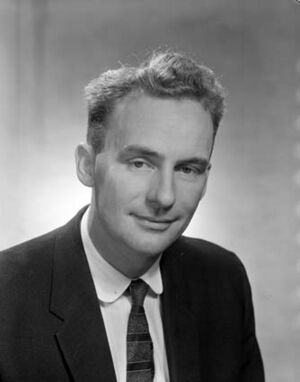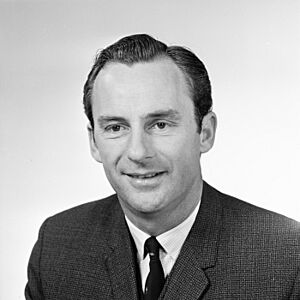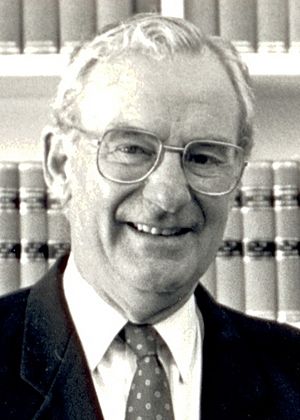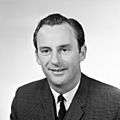Bill Hayden facts for kids
Quick facts for kids
Bill Hayden
|
|
|---|---|
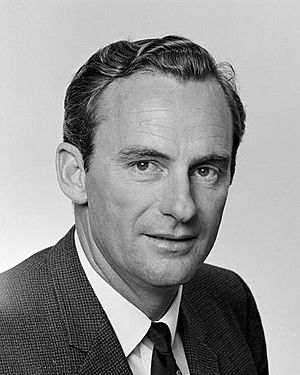
Hayden in 1971
|
|
| 21st Governor-General of Australia | |
| In office 16 February 1989 – 16 February 1996 |
|
| Monarch | Elizabeth II |
| Prime Minister | Bob Hawke Paul Keating |
| Preceded by | Sir Ninian Stephen |
| Succeeded by | Sir William Deane |
| Leader of the Opposition | |
| In office 22 December 1977 – 8 February 1983 |
|
| Prime Minister | Malcolm Fraser |
| Deputy | Lionel Bowen |
| Preceded by | Gough Whitlam |
| Succeeded by | Bob Hawke |
| Leader of the Labor Party | |
| In office 22 December 1977 – 8 February 1983 |
|
| Deputy | Lionel Bowen |
| Preceded by | Gough Whitlam |
| Succeeded by | Bob Hawke |
| Minister for Foreign Affairs and Trade | |
| In office 11 March 1983 – 17 August 1988 |
|
| Prime Minister | Bob Hawke |
| Preceded by | Tony Street |
| Succeeded by | Gareth Evans |
| Treasurer of Australia | |
| In office 6 June 1975 – 11 November 1975 |
|
| Prime Minister | Gough Whitlam |
| Preceded by | Jim Cairns |
| Succeeded by | Phillip Lynch |
| Minister for Social Security | |
| In office 19 December 1972 – 6 June 1975 |
|
| Prime Minister | Gough Whitlam |
| Preceded by | Lance Barnard |
| Succeeded by | John Wheeldon |
| Member of the Australian Parliament for Oxley |
|
| In office 9 December 1961 – 17 August 1988 |
|
| Preceded by | Donald Cameron |
| Succeeded by | Les Scott |
| Personal details | |
| Born |
William George Hayden
23 January 1933 Spring Hill, Queensland, Australia |
| Died | 21 October 2023 (aged 90) Queensland, Australia |
| Political party | Labor |
| Spouses |
Dallas Broadfoot
(m. 1960) |
| Children | 4 |
| Education | Brisbane State High School |
| Alma mater | University of Queensland |
| Occupation | Police officer (Queensland Police Service) |
| Profession | Politician |
William George Hayden (23 January 1933 – 21 October 2023) was an important Australian politician. He served as the 21st Governor-General of Australia from 1989 to 1996. Before that, he was the leader of the Australian Labor Party and the Leader of the Opposition from 1977 to 1983. He also held key government jobs like Minister for Foreign Affairs and Trade and Treasurer of Australia.
Hayden was born in Brisbane, Queensland. He worked as a police officer for eight years while studying economics. In 1961, he was elected to the House of Representatives. When the Labor Party won the election in 1972, he became the Minister for Social Security. He later became the Treasurer in 1975.
After the Labor government was dismissed in 1975, Hayden became the Leader of the Opposition in 1977. He led the Labor Party until 1983, when Bob Hawke took over. Hayden then served as Minister for Foreign Affairs and Trade from 1983 to 1988. He left parliament to become the Governor-General, a role he held for seven years.
Contents
Early Life and Education
William George Hayden was born on 23 January 1933 in Spring Hill, Queensland. His parents were Violet Quinn and George Hayden. He had a younger brother and two younger sisters. His father was an American seaman who became a piano-tuner. His mother worked as a barmaid.
Hayden started school at St Ita's Catholic Primary School. He later went to Dutton Park State School and then South Brisbane Intermediate School. He finished his high school education at Brisbane State High School in 1949. After school, he worked as a clerk before joining the police force. He also served six months in the Royal Australian Navy.
Becoming a Police Officer
Hayden joined the Queensland Police Force in 1953 after his father passed away. He trained in Brisbane and then worked in places like Mackay, Calen, and Sarina. To support his family, he also worked other jobs, like driving a milk truck.
In 1956, Hayden moved back to Brisbane. He worked as a plainclothes constable and later guarded the governor of Queensland at Government House. In 1957, he was transferred to a small police station in Redbank.
Starting in Politics (1961–1988)
As a young man, Hayden was interested in politics. He joined the Australian Labor Party (ALP) in 1957. He became an active member, working hard for the party. In 1960, he decided to go to university and started taking classes.
In 1960, Hayden was chosen to run for the federal seat of Oxley. In the 1961 Australian federal election, he surprisingly won against the sitting Liberal Party member. He was only 28 years old, making him one of the youngest members of parliament at the time. He quickly became known as a good speaker. In 1969, he joined the Opposition's main team.
Working in the Whitlam Government (1972–1975)
When the Labor Party, led by Gough Whitlam, won the 1972 Australian federal election, Hayden was given an important job. He became the Minister for Social Security. In this role, he helped create the single mothers pension and Medibank, which was Australia's first system for universal health insurance. This meant everyone could get healthcare.
On 6 June 1975, he became the Treasurer, managing the country's money. However, he only held this job for five months. The Whitlam government was dismissed by the Governor-General on 11 November 1975. After the next election, Hayden was the only Labor member of parliament left from Queensland.
Leading the Opposition (1977–1983)
After Labor lost the 1977 Australian federal election, Gough Whitlam stepped down as leader. Hayden was then chosen to lead the Labor Party and became the Leader of the Opposition. He was almost 45 years old, making him the youngest Labor leader since 1901. He started to support more moderate economic ideas.
In the 1980 Australian federal election, Labor did much better, gaining many votes. However, they still didn't win enough seats to form a government. They were 12 seats short of winning.
By 1982, there was talk that the Prime Minister, Malcolm Fraser, might call an early election. But the biggest challenge for Hayden came from within his own party. Bob Hawke, a popular former union leader, wanted to become leader. On 16 July 1982, Hayden won a vote against Hawke, but Hawke kept trying to become leader.
In December, Labor lost an important by-election, which made people doubt Hayden's ability to win the next election. On 3 February 1983, some important Labor figures told Hayden he should resign. He agreed, and Bob Hawke became the new leader on 8 February.
On the same day Hayden resigned, Prime Minister Fraser called an election for 5 March, not knowing Hayden had stepped down. Hayden famously said that "a drover's dog could lead the Labor Party to victory, the way the country is". This quote became very famous in Australian politics.
Serving as Foreign Minister (1983–1988)
Labor won the 1983 election easily, and Hayden became the Minister for Foreign Affairs and Trade. In this role, he worked to make Australia closer to its Asian neighbours. He believed that Australia would become a "Eurasian country" over time, with people of Asian and European backgrounds marrying.
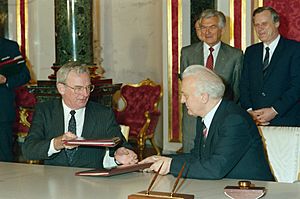
As Foreign Minister, Hayden also looked after Australia's foreign aid program. He pushed for Australia to engage with Vietnam and Cambodia, even though some other countries disagreed. He also led a review of Australia's foreign aid to make it more professional.
Becoming Governor-General (1989–1996)
After winning the 1987 Australian federal election, Prime Minister Hawke announced that Queen Elizabeth II had approved Hayden's appointment as Governor-General of Australia. This was seen as a way to thank Hayden for his service, especially since Hawke had replaced him as Labor Leader.
Hayden became Governor-General in early 1989. He served during the time when Bob Hawke was Prime Minister, and then when Paul Keating became Prime Minister in 1991. He usually would have served for five years, but his term was extended for two more years, until early 1996.
As Governor-General, he also became the Chancellor of the Order of Australia. The Governor-General is usually the Chief Scout of Australia. However, Hayden declined this role because he was an atheist, which didn't fit with the Scout Promise. Instead, he served as the "National Patron" of the Scout Association.
Later Life and Contributions
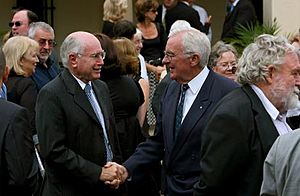
After he retired as Governor-General, Hayden continued to share his ideas on public policy. He wrote articles for magazines and newspapers about important social, economic, and political issues.
In September 2018, Hayden was baptized as a Roman Catholic. He said that he had felt "a gnawing pain in my heart and soul about what is the meaning of life." His family and friends attended the ceremony.
Personal Life
In May 1960, Bill Hayden married Dallas Broadfoot. They had three daughters and one son. Sadly, their oldest daughter, Michaela, died in 1966 at the age of five after being hit by a car.
Death
Bill Hayden passed away in Queensland on 21 October 2023, at the age of 90. This was exactly nine years after the death of Gough Whitlam. Prime Minister Anthony Albanese announced that Hayden would be honored with a state funeral.
Honours and Awards
Because he was Governor-General, Hayden was the Chancellor of the Order of Australia. In 1999, he received an award from Latvia called the Order of the Three Stars.
He also received an Honorary Doctorate of Laws from the University of Queensland in 1990 for his important work in Australia. Other awards included admission to the Order of St John Australia and the Gwanghwa Medal from Korea.
In 1996, Hayden was named the Australian Humanist of the Year. In 2007, he became a Life Member of the Australian Labor Party.
In 2017, former Prime Minister Paul Keating gave a speech praising Hayden's contributions to the Labor Party. Keating said that the important reforms made by the Labor government in the 1980s were built on the ideas Hayden developed when he was Leader of the Opposition.
Hayden Oration
A series of speeches called the "Hayden Orations" have been created by the University of Southern Queensland to honour Bill Hayden. These speeches include:
- 2016 First Oration, David Hamill, 14 August.
- 2017 Second Oration, Paul Keating, 29 September.
- 2018 Third Oration, Neal Blewett, 15 August.
- 2023 Jim Chalmers, 10 November 2023
Images for kids
-
Bill Hayden and John Howard at Padraic McGuinness's funeral in 2008
See also
 In Spanish: Bill Hayden para niños
In Spanish: Bill Hayden para niños
 | Bayard Rustin |
 | Jeannette Carter |
 | Jeremiah A. Brown |


